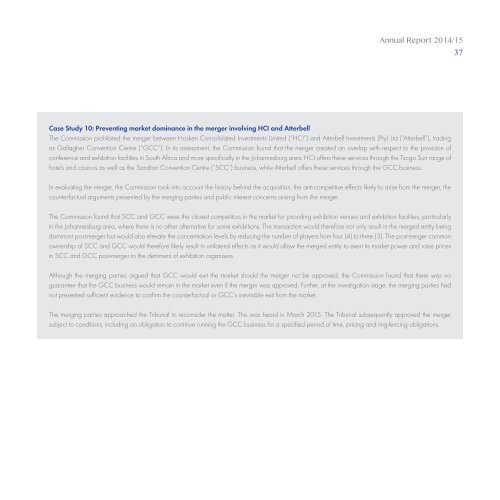2014/15 Annual Report
pzog4zx
pzog4zx
You also want an ePaper? Increase the reach of your titles
YUMPU automatically turns print PDFs into web optimized ePapers that Google loves.
<strong>Annual</strong> <strong>Report</strong> <strong>2014</strong>/<strong>15</strong><br />
37<br />
Case Study 10: Preventing market dominance in the merger involving HCI and Atterbell<br />
The Commission prohibited the merger between Hosken Consolidated Investments Limited (“HCI”) and Atterbell Investments (Pty) Ltd (“Atterbell”), trading<br />
as Gallagher Convention Centre (“GCC”). In its assessment, the Commission found that the merger created an overlap with respect to the provision of<br />
conference and exhibition facilities in South Africa and more specifically in the Johannesburg area. HCI offers these services through the Tsogo Sun range of<br />
hotels and casinos as well as the Sandton Convention Centre (“SCC”) business, while Atterbell offers these services through the GCC business.<br />
In evaluating the merger, the Commission took into account the history behind the acquisition, the anti-competitive effects likely to arise from the merger, the<br />
counterfactual arguments presented by the merging parties and public interest concerns arising from the merger.<br />
The Commission found that SCC and GCC were the closest competitors in the market for providing exhibition venues and exhibition facilities, particularly<br />
in the Johannesburg area, where there is no other alternative for some exhibitions. The transaction would therefore not only result in the merged entity being<br />
dominant post-merger but would also elevate the concentration levels by reducing the number of players from four (4) to three (3). The post-merger common<br />
ownership of SCC and GCC would therefore likely result in unilateral effects as it would allow the merged entity to exert its market power and raise prices<br />
in SCC and GCC post-merger to the detriment of exhibition organisers.<br />
Although the merging parties argued that GCC would exit the market should the merger not be approved, the Commission found that there was no<br />
guarantee that the GCC business would remain in the market even if the merger was approved. Further, at the investigation stage, the merging parties had<br />
not presented sufficient evidence to confirm the counterfactual or GCC’s inevitable exit from the market.<br />
The merging parties approached the Tribunal to reconsider the matter. This was heard in March 20<strong>15</strong>. The Tribunal subsequently approved the merger<br />
subject to conditions, including an obligation to continue running the GCC business for a specified period of time, pricing and ring-fencing obligations.


